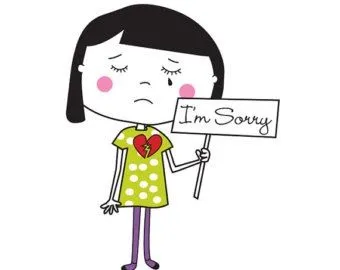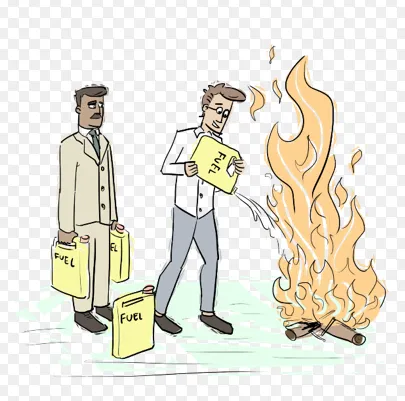You and your friend may have had an argument. You say to yourself 'Why should I apologize? I don't have to. I'm not the one who started it!'.
You lay down the subject, but the tension continues to exist as time passes by. You think of apologizing, but ego won't let you say these simple words "I'm sorry."

credit
Why it is hard to Apologize
Upbringing - There's every possibility you were brought up in a home where apologies are seldom used. No one cares about their mistakes. If so, it might be difficult for you to own up to your mistakes because it wasn't a regular practice during childhood. Making sincere apologies as you grow older will be very difficult.
Pride - Saying the words 'I'm sorry' is difficult to say sometimes because our ego gets in the way.
Extreme pride can make you too embarrassed to admit your own share of the mistake. Mind you there's a saying that says,
Pride goes before a fall
Perspective - Most times you might feel that it's only when you are responsible for the problem that an apology is in order. You only say 'I'm sorry' when you know you are hundred percent at fault. But when you and your friend say things that you would later regret, it would be difficult. You might think, why should I be the one to apologize if we both complicated things up?

credit
What You can Do
Take the initiative to apologize.
It is true that apologizing can be difficult if you are not fully to blame. The mistake didn't come from your end. Even if the fault comes from your friend, that should not excuse you of your bad behavior. Your apologizing first can make it easier for your friend to apologize too. So be quick to apologize, thinking that the passing of time will cover over the offense. Apologizing would only be easier for you the more you practice it.
Focus on Your Friend.
Remember how good and happy you feel when someone apologized to you.
Why not make your friend feel the same way?
You can apologize for the unintended consequences of your actions or the hurt that you're friend feels, even when you do not believe you were wrong. Those magical words can help your friendship.
Focus on your Friendship.
Always see an apology as a victory for your friendship. When you try to defend your actions, it may become difficult in restoring peace in such defensive atmosphere. Looking at it from another point of view, when you apologize you prevent the offense from becoming a barricade. That is, you put your friendship ahead of yourself.
Show you meant it.
When you say, 'I'm sorry that you're so sensitive about this', possibly with a tone of sarcasm, it's not an apology at all! Also, if you rationalize your behaviour it's not the same as apologizing for it. Whether you feel that your friend warrants the hurt or not, accept responsibility for your actions and acknowledge the hurt your friend feels.
Face Facts.
Everyone make mistakes. So humbly accepting your mistakes won't be a big deal. Even if you think you are not faulty in a situation, accepting that your own side of the story is perhaps not the whole story. The first person to report his case may look right, not until the other person comes and cross-examines him. A friend once told me, "It is not he who runs to the police station first that wins the case." lol!
You will be more apt to apologize if you have a realistic view of yourself and your shortcomings.
On The Bright Side
An apology can transform your friendship from one where problems continue and create tension to one where problems are small bumps in the road.
The objective of an apology is to restore peace and happiness. It's not about who's right or wrong.
Please Upvote, Comment, Follow & Resteem to show your support
I remain that humble dude @josiahebighe.